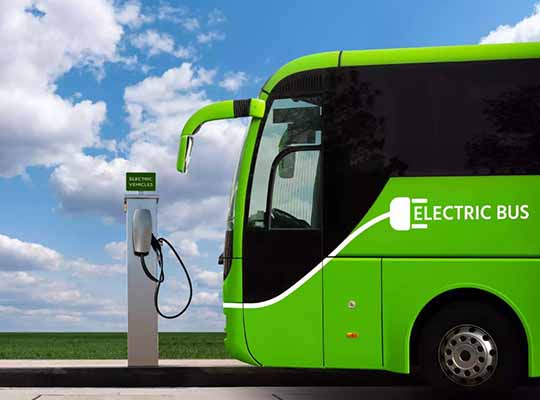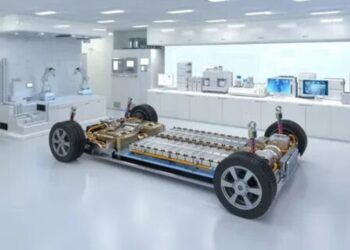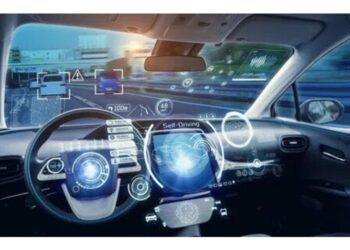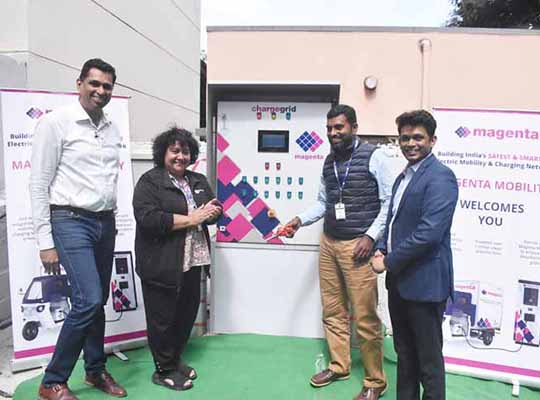The “Connected Infrastructure for Electric Buses in North America and Europe – Market Forecast to 2027” report has been added to ResearchAndMarkets.com‘s offering.
This strategic research report covers the latest trends and developments on the intelligent transportation system and charging station market for electric buses in public transport.
The total market value of public transport ITS for electric buses in Europe and North America is forecasted to grow at a compound annual growth rate of 37% from €72.6 million in 2022 to reach €355.4 million by 2027. The analyst at the same time estimates that the charging station market value for electric buses in the two regions was €160.7 million in 2022. Growing at a CAGR of 45.7%, the market value is expected to reach €1.06 billion in 2027. Get up to date with the latest information about vendors, products and markets.
The ITS market for electric buses in Europe and North America to reach €355 million by 2027
The market value for electric bus ITS deployed in European public transport operations was €57.1 million in 2022. Growing at a compound annual growth rate (CAGR) of 39%, this number is expected to reach €297.2 million by 2027. The North American market for electric bus ITS is similarly forecasted to grow at a CAGR of 30% from €15.5 million in 2022 to reach € 58.2 million in 2027.
The analyst is of the opinion that the market for ITS solutions for electric buses is in a growth phase which will last for several years to come. Mega-challenges such as urbanisation, climate change and traffic congestion continue to encourage investments in electric buses and ITS, contributing to a positive outlook for the market.
Some ITS players offer complete turnkey solutions including functionality for most of the ITS applications for electric buses utilised by public transport operators, but many vendors on the market are also specialised ITS players focusing on a few sub-systems.
Major international ITS players such as INIT, IVU, Clever Devices and Trapeze can provide turnkey solutions, including solutions for electric buses. ITS providers are beginning to see larger scale implementations of electric bus fleets after several years of mostly pilot projects with only a few vehicles each. One of the leading telematics providers in Europe and North America for electric buses is ChargePoint, following its acquisition of Dutch ViriCiti in 2021.
ChargePoint has increased its footprint in the fleet segment significantly and added both hardware and software solutions for the management of buses to its portfolio of charging station hardware, software and services. Other important vendors serving public transport companies with different types of solutions include the French group EQUANS through the subsidiary Ineo Systrans, as well as the Scandinavian companies Consat Telematics, FARA and Saga Tenix. The Canadian company GIRO is an important player in the scheduling and planning segment, while PSI Transcom is a prominent provider of depot and charging management software in Europe.
The integration of electric buses and charging stations increases the need for ITS solutions connecting all the necessary infrastructure including electric buses, charging stations and depots. Many operators and agencies start by investing in a basic monitoring solution, but as the bus fleets go from pilot projects to larger deployments, the actors need to complement with additional subsystems for dispatching, scheduling, charging station management and depot management.
Highlights from the report:
- Insights from 30 new executive interviews with market leading companies.
- New data on electric bus fleets in Europe and North America.
- Comprehensive description of the electric bus ITS value chain and key applications.
- Profiles of 22 aftermarket ITS solution and 14 EV charging hardware vendors.
- Summary of 20 OEM propositions from electric bus brands.
- Case studies of 11 electric bus initiatives.
- In-depth analysis of market trends and key developments.
- Updated market forecasts lasting until 2027.
Key Topics Covered:
Executive Summary
1 Public Transport in Europe and North America
1.1 Modal split of passenger transport
1.2 Bus fleets and public transport utilisation
1.3 Market shares for bus and coach OEMs
1.4 Electric vehicle types and electric bus fleet statistics
1.4.1 Hybrid electric vehicles
1.4.2 Plug-in hybrid electric vehicles
1.4.3 Electric vehicles
1.4.4 Electric bus fleet statistics
1.5 Organisation and contracting in public transport
2 ITS Technologies and Solutions
2.1 Public transport ITS infrastructure
2.1.1 Vehicle segment
2.1.2 Roadside segment
2.1.3 Back-office segment
2.1.4 Traveller segment
2.1.5 GNSS segment
2.1.6 Network segment
2.2 Public transport management
2.2.1 Planning and scheduling tools
2.2.2 Computer aided dispatch systems
2.2.3 Traffic signal priority
2.2.4 Depot management
2.3 Traveller management
2.3.1 Passenger information
2.3.2 Entertainment
2.3.3 Fare payment
2.4 Driver management
2.4.1 Driving data registration and analysis
2.4.2 Video-based driver monitoring
2.4.3 Insurance risk management
2.5 Vehicle management
2.5.1 Vehicle diagnostics and maintenance planning
2.5.2 On-board security solutions
2.6 Charging station management
2.6.1 Station management
2.6.2 Energy management
2.6.3 The Open Charge Point Protocol (OCPP)
3 Charging Technologies and Standards
3.1 Electric vehicle charging
3.1.1 AC and DC
3.1.2 Charging modes and levels
3.2 Connector standards
3.2.1 Type 1/SAE J1772
3.2.2 Type 2
3.2.3 Combined charging system (CCS)
3.2.4 CHAdeMO
3.2.5 North American Charging Standard (Tesla)
3.2.6 GB/T
3.3 Electric bus charging
3.3.1 OppCharge
3.3.2 Depot charging
3.3.3 Opportunity charging
3.3.4 Battery capacity and charging time
4 Market Forecasts and Trends
4.1 Market analysis
4.2 Value chain analysis
4.2.1 Automotive industry players
4.2.2 ITS and telematics industry players
4.2.3 Charging station industry players
4.3 Industry trends
4.3.1 Open architectures alter the ITS value chain
4.3.2 Connected charging stations a requirement for public transport operations
4.3.3 The future of opportunity charging remains uncertain
4.3.4 The major bus OEMs have entered the electric bus market
4.3.5 Standards improving interoperability essential for the electric bus market
4.3.6 The electric bus market continues to grow in the aftermath of COVID-19
4.3.7 Energy supply will be an increasingly important issue for electric bus fleets
4.3.8 Centralised power cabinets may save space and money in electric fleet depots
5 OEM Products and Strategies
5.1 Alexander Dennis (NFI Group)
5.2 Bluebus (Bollore Group)
5.3 BYD
5.4 CaetanoBus (Salvador Caetano Group)
5.5 Daimler Truck Group
5.6 Ebusco
5.7 Gillig
5.8 Irizar e-mobility (Irizar Group)
5.9 Iveco Group
5.10 MAN Truck & Bus
5.11 New Flyer (NFI Group)
5.12 Proterra
5.13 Rampini
5.14 Scania
5.15 Solaris Bus and Coach
5.16 Switch Mobility
5.17 Van Hool
5.18 VDL Bus and Coach (VDL Groep)
5.19 Volvo Group
5.20 Yutong Group
6 Aftermarket Solution Providers
6.1 Actia
6.2 Allego
6.3 Atron
6.4 BP Pulse Fleet
6.5 Clever Devices
6.6 Consat Telematics
6.7 EQUANS
6.8 FARA (Ticketer)
6.9 GIRO
6.10 INIT
6.11 IVU
6.12 Optibus
6.13 Pilotfish (Voith)
6.14 PSI Transcom
6.15 Saga Tenix
6.16 Telia Company
6.17 Questar Auto Technologies
6.18 Trapeze Group (Modaxo)
6.19 Twaice
6.20 Verkehrsautomatisierung Berlin (Hanning & Kahl)
6.21 Webfleet
6.22 ZF Bus Connect
7 Charging Station Providers
7.1 ABB
7.2 BTC Power (Innogy)
7.3 ChargePoint
7.4 Circontrol
7.5 Efacec
7.6 Ekoenergetyka
7.7 Heliox
7.8 IES Synergy
7.9 InCharge Energy (ABB)
7.10 Kempower
7.11 SBRS (Shell Group)
7.12 Siemens
7.13 Tritium
7.14 XCharge
8 Case Studies: Electric Bus Projects
8.1 Arriva
8.2 Association du Transport Urbain du Quebec (ATUQ)
8.3 Berliner Verkehrsbetriebe (BVG)
8.4 Keolis
8.5 Metropolitan Transport Authority (MTA)
8.6 Nobina
8.7 Qbuzz
8.8 RATP Group
8.9 Toronto Transit Commission (TTC)
8.10 Transdev
8.11 VR Group













